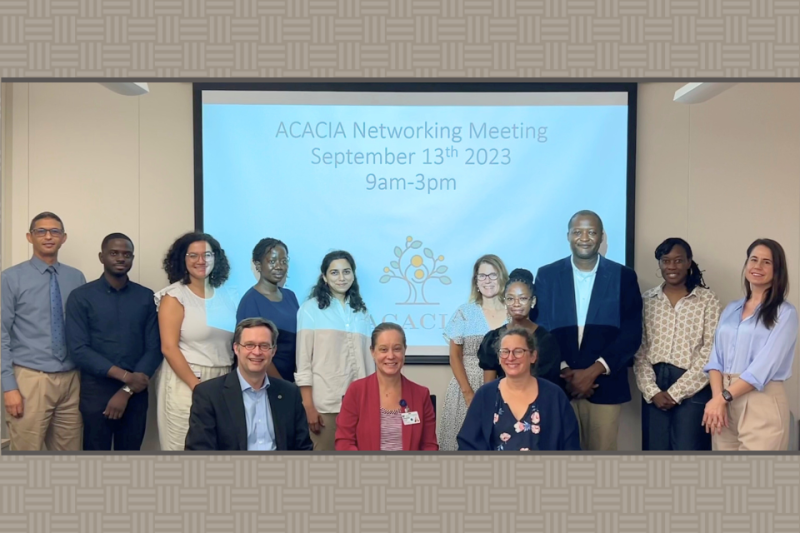
Although less than one percent of autism research currently takes place in sub-Saharan Africa, by 2050, approximately 40 percent of the world’s children will live in the region.
That’s a lot of autistic children in low-and-middle-income countries (LMICs) who are missing out on helpful evidence-based services and supports.
But a recent autism partners meeting hosted by the Duke Center for Autism and Brain Development could help pave a new way forward.
Organized as part of a Global Brain and Nervous System Disorders Research Across the Lifespan Fogarty/NIMH grant to implement early autism intervention in South Africa, the meeting was hosted by principal investigator Lauren Franz, MBChB, MPH, who is an associate professor of psychiatry and global health at Duke and an expert in implementing autism intervention for—and with—low-resource communities. The two-day gathering included partners from the University of Cape Town’s Center for Autism Research in Africa (CARA), Kilimanjaro Christian Medical Center in Tanzania, and other strategic collaborators, including the Western Cape Education Department.
It marked the first time these colleagues have been able to gather in person since the grant launched in 2022.
“There’s simply no replacement for the creativity and ideas generated by face-to-face conversation.”
— Petrus de Vries, MBChB, FRCPsych, PhD
“There’s no substitute for meeting in person,” said Petrus de Vries, MBChB, FRCPsych, PhD, CARA director and the Sue Struengmann Professor of Child & Adolescent Psychiatry at the University of Cape Town. “There’s simply no replacement for the creativity and ideas generated by face-to-face conversation.”
The grant team aims to test a contextually adapted autism intervention informed by the Early Denver Start Model (ESDM) for young children in South Africa. ESDM is a well-established early intervention method that uses naturalistic therapeutic strategies to promote children’s social engagement and communication abilities. Using a cascaded task sharing approach, local ESDM certified supervisors train community-based early childhood development practitioners (non-specialists) to coach caregivers who, in turn, support growth in their autistic child’s communication abilities during everyday activities.
As they implement and test the effectiveness of this cascaded intervention, the team is looking at specific challenges South African communities face in the autism arena that could affect implementation of the caregiver coaching approach. Franz and her colleagues are also asking how research capacity can be expanded for autism and neurodevelopmental conditions across sub-Saharan Africa.
One answer? Keep prioritizing those long-term partnerships.
Denville Dawson, Deputy Chief Education Specialist for inclusive and specialized education at the Western Cape Education Department and a key partner on the project, said that increasing capacity in his country will require fostering durable relationships with political leaders and other decision makers. “We need to secure sustainability for the interventions,” he said.
Dr. Judith Boshe, a psychiatrist at Kilimanjaro Christian Medical Center, noted that other sub-Saharan countries look to South Africa as a model. “There was a lot to learn at this meeting,” she said. “I'm very glad I was able to make it. Coming from another African country, you read about the service provision in South Africa, and you think you'll never reach that level. But then, coming here [to Duke], you realize it’s collaborative work. And that brings hope; that motivates me.”
As year two of the grant launches, Franz and her team are focused on recruitment and enrollment—and training. Preparing practitioners who can deliver autism intervention in schools is especially important, said Franz. And the lessons the team is learning are transferable to other low-resource settings.
“Whatever research we do, we think about how it translates,” she said. “How do we reach populations that are underserved, whether in South Africa or North Carolina? All these families and communities face major systemic barriers to access.”
South African education specialist Dawson was reminded of the power of translation when he met with Durham County Education Department officials during his Duke visit. “It was inspiring to hear how they address needs for learners with autism,” he said. “But it was equally inspiring to hear the challenges they face. These challenges are similar to what we have in South Africa. That didn’t discourage me. It actually gave me hope that we are in this together.”
By meeting’s end, global partners had shared not only strategies and lessons learned in the first year of the research, but also laughter, good food, and stories that helped express why they do this work. “Research is a human endeavor,” said de Vries. “At the end of the day, there’s no replacement for those connections.”
Franz agreed. “It’s about communication,” she said. “And it’s about humility. Not assuming you have all the answers on your own—that’s what makes real partnerships possible.”
“It’s about communication. And it’s about humility. Not assuming you have all the answers on your own—that’s what makes real partnerships possible.”
— Lauren Franz, MBChB, MPH
Read the study protocol, published in the journal "PLOS One" in January 2024.